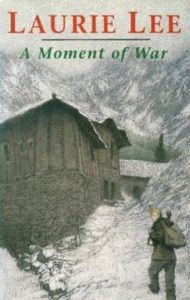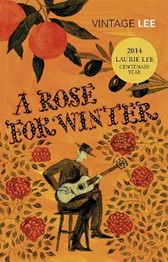Most famous for his autobiographical work Cider with Rosie, the Gloucestershire-born Lawrence Edward “Laurie” Lee, was also a great lover of Spain. Paul Whitelock reminisces about the three books Lee wrote about this country, pre-, during and post- Civil War
 I first came across Laurie Lee as a 19-year-old while at university and anticipating my year abroad in Spain and Germany. In that year, 1969, Penguin published his book about his journey on foot across Spain in 1934, As I Walked Out One Midsummer Morning.
I first came across Laurie Lee as a 19-year-old while at university and anticipating my year abroad in Spain and Germany. In that year, 1969, Penguin published his book about his journey on foot across Spain in 1934, As I Walked Out One Midsummer Morning.
The book tells of Lee’s walk from La Coruña to Málaga armed with very little but his fiddle. We learn of his adventures en route, the kindness of strangers, and we can smell the poetic descriptions of the food he samples. His trip is cut short by the onset of the Spanish Civil War in 1936 and he is repatriated to the UK, only to return later to fight against Franco in the International Brigades.
I couldn’t put the book down. It still rates as the best book about Spain that I’ve ever read, with Duende by Jason Webster, Driving Over Lemons by Chris Stewart, The Sun Also Rises by Ernest Hemingway and Ghosts of Spain by Giles Tremlett coming in a distant second, third, fourth and fifth.
[Ed: See Top 5 writers on Spain]
 Hungry for more, I got a copy of A Moment of War, when it was eventually published in 1991. It was a long wait, but worth it.
Hungry for more, I got a copy of A Moment of War, when it was eventually published in 1991. It was a long wait, but worth it.
This book describes how, in December 1937, Lee set out for Spain to fight for the Republican cause against Franco’s Nationalists. He could not persuade anyone to help him and so eventually crossed the Pyrenees alone in a snowstorm, armed with little else but his beloved fiddle.
He then encountered Republican sympathisers who suspected him of being a Nationalist spy and imprisoned him. On the day scheduled for his execution a fortunate encounter led to his being released and joining the International Brigades.
The book then recounts Lee’s experiences as a Republican soldier in Figueres, Valencia, Tarazona, Madrid, Teruel and Barcelona. He left Spain in February 1938.
There has been some doubt expressed about the historical accuracy of the book. Lee himself wrote that his diaries had been stolen and so he relied on memory for what is presented as an eyewitness account. He wrote it some 50 years after the event, so some inaccuracy is likely.
Nevertheless, it’s still a fine book, with Lee’s background as a poet shining through his prose.
 Fifteen years after his last visit Laurie Lee returned to Spain and specifically Andalucía. He found a country broken by the Civil War, but the totems of indestructible Spain survive: the Christ in agony, the thrilling flamenco cry, the pride in poverty, the gypsy intensity in vivid whitewashed slums, the cult of the bullfight, the exultation in death, the humour of hopelessness. All of these the paradoxes deep in the fiery bones of Spain.
Fifteen years after his last visit Laurie Lee returned to Spain and specifically Andalucía. He found a country broken by the Civil War, but the totems of indestructible Spain survive: the Christ in agony, the thrilling flamenco cry, the pride in poverty, the gypsy intensity in vivid whitewashed slums, the cult of the bullfight, the exultation in death, the humour of hopelessness. All of these the paradoxes deep in the fiery bones of Spain.
Rich with kaleidoscopic images, A Rose for Winter, first published in 1971, is as sensual and evocative as the sun-scorched landscape of Andalucía itself.
*****
Oddly the order of publication does not coincide with the chronology of events. This last book of his “SpanishTrilogy” was published before his Civil War memoir, but Lee has explained this anomaly.
But who cares anyway?
Laurie Lee died aged 82 in May 1997 in his beloved village of Slad in Gloucestershire. He was so beloved in Spain that an obituary appeared in El País. Click here: https://elpais.com/diario/1997/05/16/agenda/863733601_850215.html
Acknowledgements:
Amazon
Google
Penguin Books
Wikipedia
